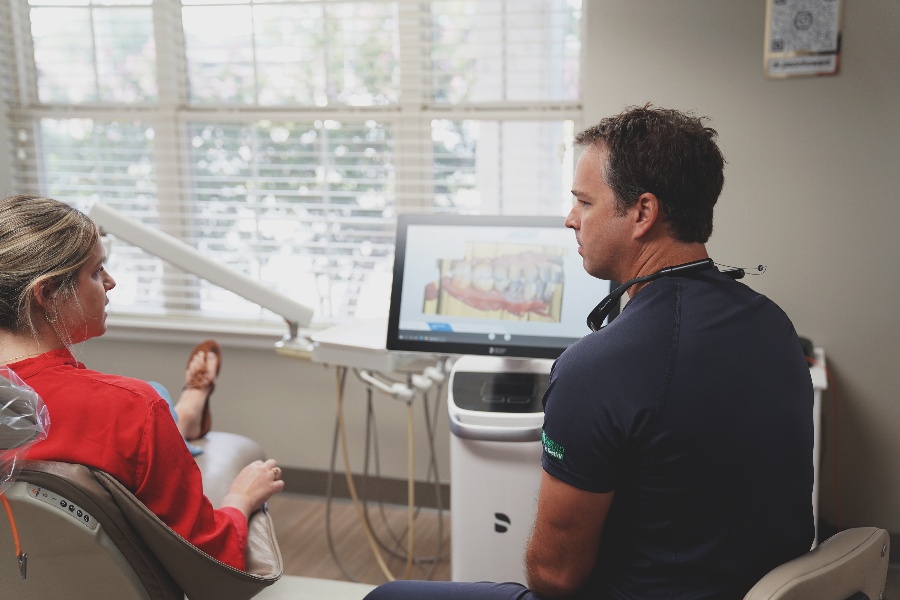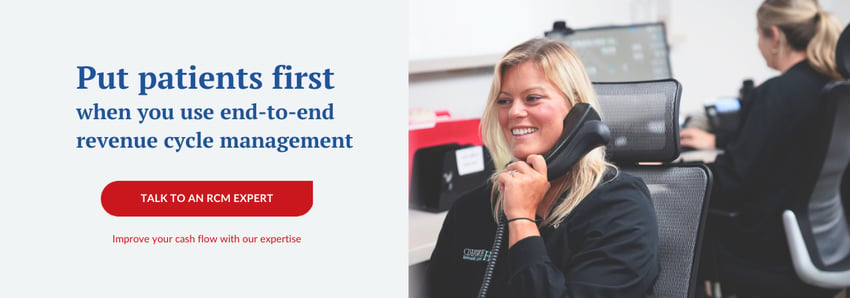5 things every dental professional should note when reviewing a patient's dental insurance breakdown form


If you're like most people, trying to make sense of a patient’s dental insurance policy can feel like reading a foreign language. Even if you’ve been working in the dental industry for years, it can be a challenge.
Understanding your dental patient’s insurance coverage is crucial to properly communicate to patients what kind of financial coverage they can expect from their provider.
So, what should you be looking for in your dental insurance breakdown form?
DCS provides insurance verification services ahead of your patient’s visit, providing you ample time to understand their dental insurance breakdown form.
In this article, we’re going to cover which details to pay attention to in the dental insurance breakdown form in order to not just communicate effectively with your patient, but also to collect efficiently from them after their treatment.
Keep in mind, while we recommend you take note of each of these details, you don’t necessarily need to dive deep into each and every detail with the patient during check in. Just note the details that might affect their out-of-pocket of their treatment, and inform your patient prior to performing their dental treatment.
1. Coverage details
Start with your patient’s actual coverage. This will help you get a general idea of what their out-of-pocket is going to be.
“It’s important for you to be familiar with the common limitations of most insurance plans. This way, you’ll be able to more accurately predict co-payments, thus saving you time and money.” - Dentistry IQ
These are the details of the patient’s coverage you should take note of:
- Explanation of what the patient’s insurance covers. The patient’s dental insurance breakdown form should clearly explain what dental services and procedures are covered under their policy. This includes routine check-ups, cleanings, X-rays, fillings, and more. Make sure the patient understands what services are covered and which ones are not.
- Limitations and exclusions. The patient’s policy may have limitations on certain services, such as a maximum number of cleanings per year, a waiting period for certain procedures, or a missing tooth clause.
It may also exclude certain procedures altogether, such as cosmetic dentistry, orthodontics or implants. Be sure to read these limitations and exclusions carefully, so you can communicate it to your patient clearly.
- Deductibles and co-payments. The dental patient’s insurance policy may require a deductible or co-payment for certain services. Make sure you and the patient understand what these fees are (if they apply to the patient) and how they are calculated. Some policies may have a percentage-based co-payment, while others may have a fixed fee.
Make sure this is the patient’s most recent, up-to-date dental insurance breakdown form. If you’re struggling to make time to obtain this information during your insurance verification process, you can partner RCM experts that offer insurance verification services.
Their experts will get this breakdown for you.
2. Network providers
The patient’s dental insurance policy may only cover dental services provided by dentists and specialists within the insurance company's network.
This means that if the patient receives care from a dentist who is not in the network, their insurance may not cover the cost or may cover only a portion of it.
Related: In-network or out-of-network: Pros and cons for your dental practice
Really, you only need to note this if the patient’s provider is out-of-network, as they might not have coverage and be unaware.
It's important to note that even if your dentist is in the network, not all services provided by that dentist may be covered under your policy.
3. Benefit maximums
Benefit maximums are an important aspect of dental insurance that can greatly affect your out-of-pocket expenses for dental care.
- Annual maximums: Dental insurance policies typically have an annual maximum, which is the maximum amount the policy will pay for covered services in a given year. This can range from a few hundred dollars to several thousand dollars, depending on the patient’s policy.
- Lifetime maximums: Some policies also have lifetime maximums, which are the maximum amount the policy will pay for covered services over the course of the patient’s lifetime. This is less common, but it's important to understand if the patient’s policy has a lifetime maximum and what that amount is.
Understanding the patient's benefit maximum is crucial for patients to avoid unexpected expenses. Make sure you check the patient’s annual and lifetime maximums and what may be remaining to avoid surprise out-of-pocket expenses.
4. Waiting periods and Missing Tooth Clause
Waiting periods are a common feature of dental insurance policies, and they can greatly affect when you are able to receive certain services.
Related: What is a dental insurance waiting period?
The dental insurance breakdown should specify the length of waiting periods for various services. Waiting periods can range from a few months to a year or more, depending on the service.
Waiting periods typically apply to more expensive services, such as root canals and crowns, as well as services that are considered elective, such as orthodontic treatment.
Make sure you understand which services have waiting periods and how long those waiting periods are, so that you can tell your patient.
This is another key detail to note to avoid your patient getting a surprise bill.
If the patient needs a service that has a waiting period (especially if it is a costly treatment), they should understand that, so they can make an informed decision on when to have the treatment. By communicating the waiting period, you can help the patient plan accordingly.
Also, be sure to track the date of eligibility to know when the waiting period will be met.
A missing tooth clause may apply if the patient had the replaced tooth extracted or missing prior to having the insurance benefits.
Also note that In certain circumstances, a denied claim may be appealed by your RCM expert.

5. Claim process
Your claims process is how your practice gets paid. So there are a few details you need to note to be sure you are creating clean claims:
- Claim submission methods: The dental insurance provider may offer different methods for submitting claims, such as online, by mail, or by fax.
- Claim submission deadlines: The dental insurance company may have deadlines for submitting claims, so be sure to understand how much time you have to create and submit a claim after receiving dental services.
Note that if you use RCM services that submit claims for you, you should still be creating those claims accordingly, so they can be submitted on time.
- Coordination of benefits: If the patient has multiple dental insurance policies, their dental insurance breakdown should specify how the polices will coordinate to ensure they receive the maximum benefits.
Understanding the claims process, even if you outsource to an RCM vendor, can help you get paid what you’re owed.
Ready to verify your patient’s insurance benefits efficiently?
By paying attention to details such as coverage details, network providers, benefit maximums, waiting periods, and the claims process, dental professionals can help patients get the most out of their insurance policies.
By using the information in this guide, dental professionals can ensure that they are providing the best care possible to their patients, while also helping them navigate the often confusing world of dental insurance.
DCS offers insurance verification services that can support you in this process. Our experts work to get you insurance breakdowns quickly and accurately. To learn more about our end-to-end RCM services at DCS, schedule a call with us.
Related Posts
Dental billing resources


